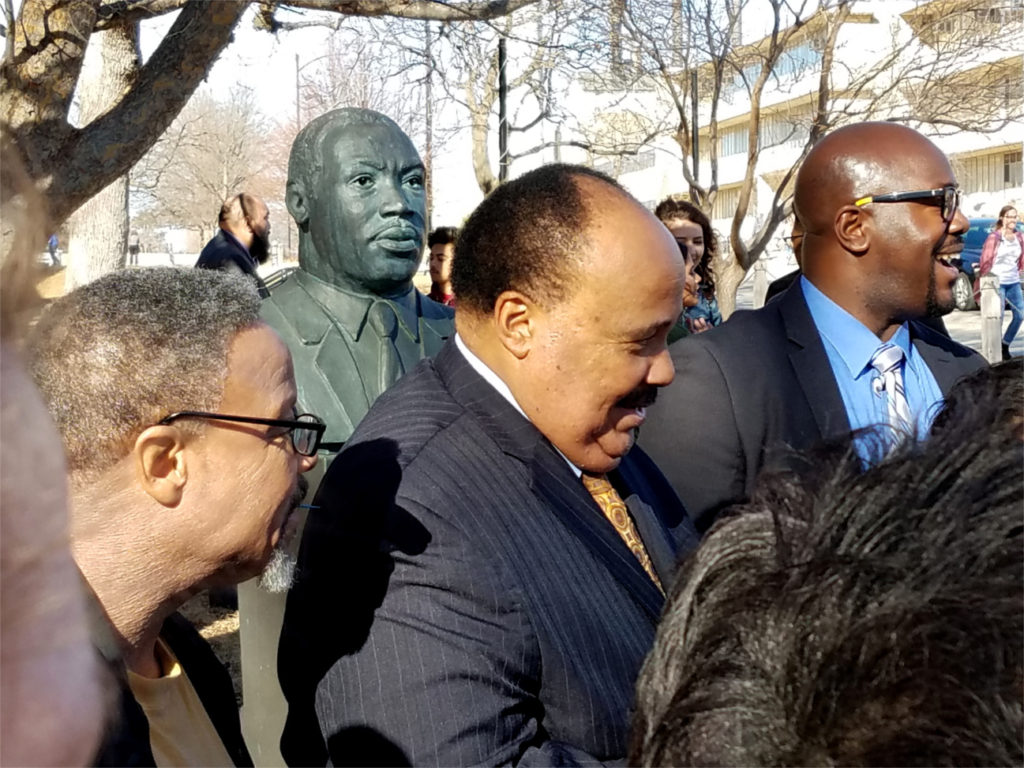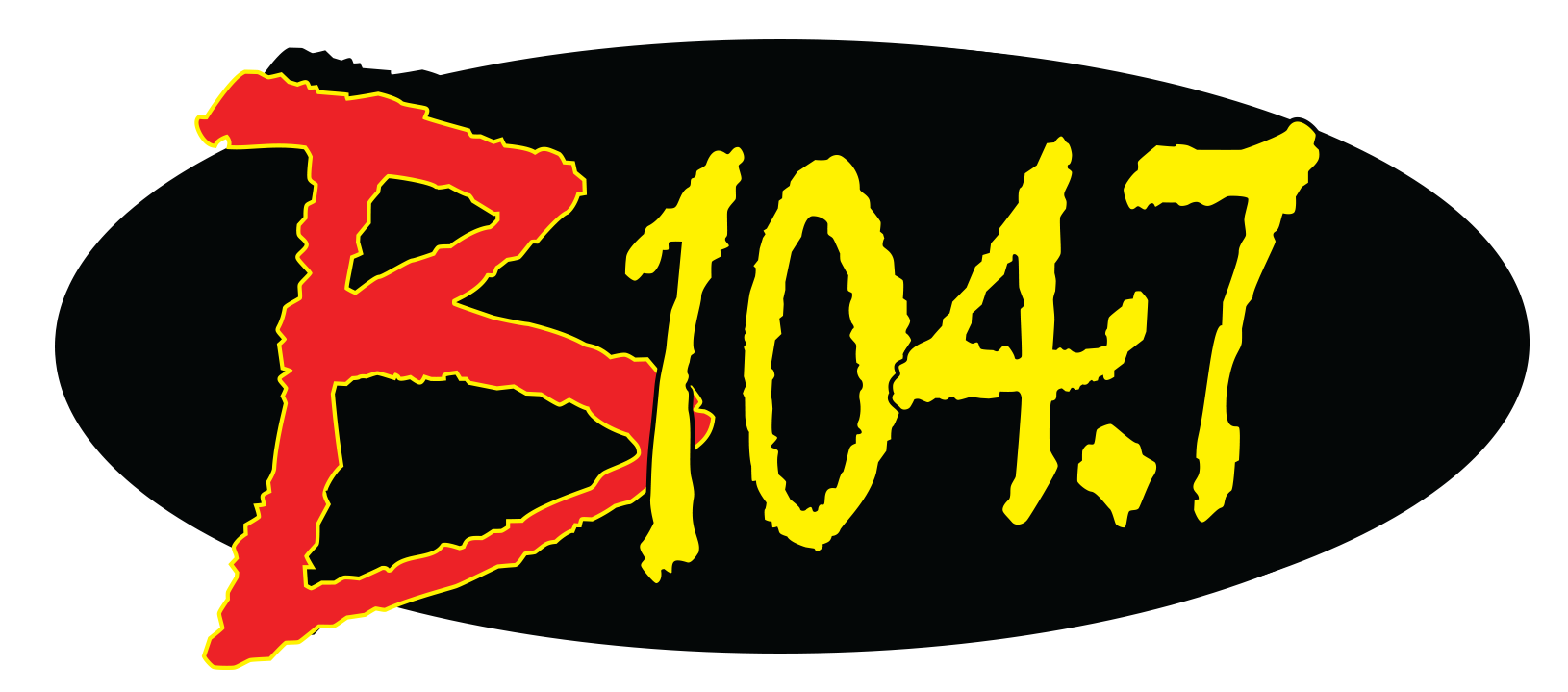

Martin Luther King III speaks with K-State students, administration and faculty members Thursday in front of the bust of his father beside Ahearn Field House. King was there to witness the wreath laying ceremony as a part K-State’s annual MLK Observance Week following his speech inside Forum Hall. (Staff photos by Brady Bauman)
Martin Luther King III was 10 when his iconic father, Dr. Martin Luther King, Jr., was assassinated on April 4, 1968, in Memphis, Tennessee.
The oldest son of Martin and Coretta Scott King, he remembers traveling with his father and witnessing the fight for civil rights. It was a movement of non-violence. And even though his father’s life was taken by an act of violence, his father’s message of peace and resistance to bloodshed reverberated inside K-State’s Forum Hall Thursday afternoon.
And this speech from King, titled, “50 years later, Progress, or Not,” was special for Kansas State University.
Nearly 50 years ago to the day, King’s father spoke inside Ahearn Field House on the campus of KSU, where his bust stands just outside of it.
“Human beings are capable of great kindness,” King said inside a packed house. “It’s an innate value that nearly all people have inside of them. Sometimes it’s obscured, or subordinated to other values, but it’s always there for most of us. Almost everyone can tell stories about acts of human kindness that they’ve experienced or witnessed.
“Now tolerance, on the other hand — that’s a little more challenging. Tolerance can be a struggle for all of us. That’s been a problem since America was founded.”
Attendees hung on every word King spoke. Initially, the speech was scheduled to take place inside the K-State Alumni Center. But, community and student interest in King’s speech had KSU move it to a bigger venue. Overflow with a closed stream of King’s speech was played in the K-State Student Union courtyard and the Alumni Center banquet room.
King, like his father, delivered a 40-minute speech balanced in both the macro concerning the civil rights climate past and present to the specifics of state voting laws, women’s rights and expanding America’s economic opportunity for the poor.
“Look, men, you’ve got to get your house in order,” King said. “It’s very sad we have mistreated the women of our nation. There’s something wrong with a society that still pays men far more than women.”
“Gender equality is going to happen,” King added to robust appreciation from the audience.
King also addressed President Donald Trump.
“Racial tolerance has been a critical problem in the United States, from the very beginning,” King said, earlier referencing slavery and treatment of Native Americans. “And unfortunately it still is, as evident most recently by President Trump’s remarks disparaging people from Haiti, Nigeria, El Salvador and other African nations. In fact, one of the first questions that I was asked just a few days ago was what would your father think as we approached his 89th birthday? What would he think about the Commander-in-chief’s remarks?
“And I said, you know, I can’t say personally what he would say. But I can say and share some of the words that’s he’s said about things from time to time. What he said was, ‘Nothing in all the world is more dangerous than sincere ignorance and conscientious stupidity.’”
The crowd then cut off King with enthusiastic applause and after a moment, he continued.
“I would add, and I’ve said this publicly, that we as a nation have to work on the heart of the president, because I would like to believe that his intent is not to divide, but his rhetoric does create division,” King said. “Just as many worked on the heart of George Wallace, and he changed and reformed and apologized — but that’s going to be a higher challenge with this president.”
Still, King moved forward with a call to the nation to reach across cultural and political differences.
“We also have a problem of self-segregation,” he said. “Americans of all races and ethnic groups tend to settle into comfort zones that include people much like us. Celebrating one’s culture is a great thing, but it is also important to celebrate diversity in a pluralistic society. And celebrating diversity in a meaningful way means celebrating other cultures and people as well as our own.”
Sometimes, it takes a real effort to reach out beyond your comfort zone, to engage with someone of a different culture… now a days, we see more interracial friendships than was the case 20 or 30 years ago, and that’s a good thing.
“I would like to encourage all Americans to make 2018 a year in which all of us broaden our circle of friendships, to include people of other races and cultures.”
King said more diverse friendships can increase good will in the country and most importantly of all, can be accomplished at the community level.
“Best of all, we don’t have to wait for the political system to do anything — thank God,” he said to laughter and applause.
King spoke of non-violence and credited it with the success of the civil rights movement during his father’s time. He said the movement benefited from training activists in non-violence, despite the fact more than three dozen civil rights activists were killed.
He said a part of non-violence includes having an open dialogue with contrasting views.
“I refuse to be so arrogant in my convictions that I would tune out those that I disagree with,” he said. “I may be a progressive, but I owe my conservative sisters and brothers a fair and respective ear.”
King also took a moment to address state voting laws — a topic he knew is of special importance in Kansas.
“Political activism is not for everyone,” he said. “But I do believe we ought to do more to encourage everyone to vote, and to eliminate the barriers — both legal and illegal — that discourage and prevent citizens from exercising their right to vote.
Those remarks also drew a loud applause.
King continued.
“That is why I support the restoration of the Voting Rights Act to full strength, so that no state can get away with institutionalizing measures that prevent citizens from voting,” he said, drawing more applause.
King then went off-script.
“Let me stop just a minute, to give an explanation,” he added. “Because what some do not realize is that all across America, certain legislatures have passed laws making it more difficult to vote. We should be making it easier to vote. We go all over the world promoting democracy, but yet when it comes to our own specific districts, we suppress democracy.”
King said that while he agrees everyone should have identification for voting, he countered that some communities don’t have appropriate I.D. for voting. King said a readily available photo social security card should be acceptable for all elections.
“Almost everyone has a social security card,” he said. “Not everyone has a driver’s license.”
Often throughout his speech, King gracefully zoomed in and out of the issues facing our time, urging the audience to understand progress is a road full of delays and defeat. He advocated a perspective that embraces the “long view” and said that while his parents didn’t live to see the election of the first black president, their efforts helped see that promise come to fruition.
Like the message of the “Poor People’s Campaign” championed by his father, King said a country with a $20 trillion economy shouldn’t have 48 million people living in poverty.
“Understand, I’m not saying go out and give people money,” he said. “But what I am saying is create opportunities and options so everyone can create a decent life for themselves and their families.
“And while I’m talking about it, Martin Luther King, Jr., was not killed because he was talking about racial integration, or black people being able to ride on the front of the bus, or the Voting Rights Act or the Civil Rights Act.
“He was killed because he talked about something very revolutionary. He talked about a radical redistribution of wealth and resources. Again, he did not mean going to somebody who was wealthy and taking your money. What he meant was how do we spend the resources on our great planet. This nation and world is plentiful. There’s abundance, but we seem not to know it.”
The post MLK III echoes father’s legacy, challenges in today’s world appeared first on News Radio KMAN.

